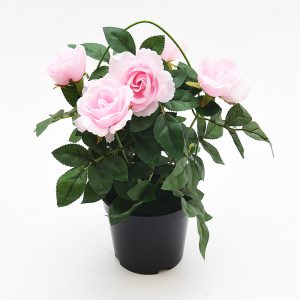Sustainable decor involves making environmentally conscious choices when it comes to decorating and designing spaces. Artificial flowers can be part of a sustainable decor approach, especially when chosen and used thoughtfully. Here’s how artificial flowers can align with the eco side of sustainable decor:
- Reduced Waste: Artificial flowers are a one-time purchase that can be used for years, reducing the need for constant replacements that contribute to waste in the form of discarded real flowers.
- Energy and Water Savings: The production of artificial flowers requires fewer resources like water and energy compared to the cultivation and transportation of real flowers, which can be resource-intensive.
- Longevity: High-quality artificial flowers can last for many years with proper care, decreasing the need to continually purchase fresh flowers that have a short lifespan.
- No Pesticides or Chemicals: Artificial flowers don’t require pesticides or chemicals for growth, reducing the environmental impact associated with the use of these substances in conventional flower cultivation.
- Indoor Air Quality: Unlike some real flowers that release pollen and allergens into the air, artificial flowers don’t negatively affect indoor air quality, making them a healthier choice for allergy-sensitive individuals.
- Preservation of Biodiversity: Choosing artificial flowers over certain exotic real flowers helps protect ecosystems and preserves biodiversity by reducing demand for rare or unsustainable floral species.
- Recyclable Materials: Some artificial flowers are made from recyclable materials, reducing the environmental impact when they eventually reach the end of their lifespan.
- Avoiding Seasonal Constraints: By using artificial flowers, you can avoid relying on out-of-season flowers that might be flown in from distant locations, contributing to a smaller carbon footprint.
- Less Water Usage: Artificial flowers don’t require watering, which conserves water resources, especially in regions facing water scarcity.
- No Soil Erosion: The cultivation of real flowers can contribute to soil erosion and other environmental issues. Artificial flowers eliminate this concern.
- Design Flexibility: Sustainable decor often involves choosing elements that can adapt to changing styles and seasons. Artificial flowers can be repurposed and rearranged to suit evolving design trends.
- Educational Value: Using artificial flowers can serve as an educational opportunity to discuss sustainability, resource conservation, and the importance of making eco-friendly choices.
However, it’s important to note that not all artificial flowers are created equal in terms of sustainability. To ensure your artificial flower decor aligns with sustainable principles, consider the following:
- Choose Quality: Opt for high-quality, realistic artificial flowers made from eco-friendly materials such as silk or recyclable plastics.
- Avoid Cheap Plastics: Avoid cheap plastic flowers that are less durable and might not be environmentally friendly in their production.
- Second-Hand Options: Consider purchasing second-hand artificial flowers from thrift stores or online marketplaces to further reduce the demand for new production.
- Long-Term Use: Commit to using your artificial flowers for an extended period to maximize their sustainability benefits.
By carefully selecting and using artificial flowers in your decor, you can contribute to sustainable design practices while still enjoying the beauty and ambiance that flowers bring to indoor spaces.
























